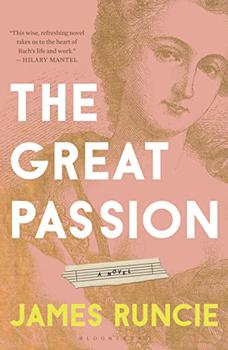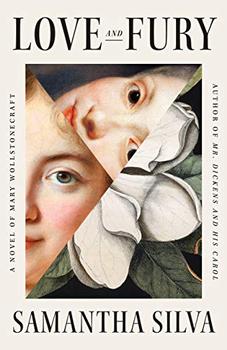Summary | Excerpt | Reviews | Beyond the book | Read-Alikes | Genres & Themes | Author Bio

The narrator of James Runcie's The Great Passion is 14-year-old Stefan Silbermann, son of a famous pipe organ craftsman in the town of Freiberg in Germany. The year is 1726; Stefan's mother has just died and his still-grieving father has decided his son would benefit from spending a year at St. Thomas's boarding school in Leipzig, an institution renowned for its music program. It soon becomes apparent that young Stefan is a gifted singer, and he's taken under the wing of the school's music director: Johann Sebastian Bach. The young man spends the next year under Bach's tutelage, culminating in the premiere performance of the composer's masterpiece, the St. Matthew Passion.
Runcie juxtaposes two stories. The first is a rather routine coming-of-age tale with few surprises. Stefan's bright red hair makes him a target for bullying by his fellow students, which is exacerbated by their jealousy of his talent. Over the course of the novel he learns how to stand up for himself and he develops the confidence to allow his talents to shine. Although somewhat predictable, it's nevertheless an entertaining narrative, thanks to the author's brilliant depiction of his main character. Stefan seems completely real, and readers can't help but root for his success in love and music.
The secondary plot, which I found more interesting, is the portrait Runcie paints of Bach. He cleverly inserts Stefan into the composer's household, where he's permitted to stay while refining his craft. The young man becomes a "fly on the wall," so to speak, able to observe Bach as he interacts with his family and other musicians. The resulting depiction is remarkable; while at his core Runcie's Bach is a kind and caring person, he's not immune to fits of anger over a part poorly sung, envy over the success of a peer, sarcasm in response to his performer's complaints, or obsession over bringing his musical ideas to fruition. It's the character's imperfections that lend verisimilitude to the portrayal and create a complete and believable picture of what the man may have been like in the flesh.
There were other aspects that I found impressive as well, the first and foremost of these being the author's ability to capture the utter chaos of a family in constant motion. Bach had 20 children and composed more than 1,000 works during his lifetime (1685-1750), and Runcie convincingly shows the discipline and humor needed to retain some semblance of order in such a high-stress household. I was also surprised at the heartfelt spirituality embedded throughout the text. As someone whose primary occupation was to set biblical texts to music, Bach's life revolved around the Lutheran Church. But Runcie goes beyond historical necessity to embed quiet religious wisdom in certain passages, particularly those concerning grief. While some are specific to Christian theology, most of these sections are more generic, applicable to any faith. Although I'm an atheist, I found this aspect to be moving, and a major highlight of the narrative. And it's familiar territory for Runcie, who is the son of a former Archbishop of Canterbury and also the author of the Grantchester Mysteries, featuring clergyman detective Sidney Chambers.
The book is well-paced, but it's hardly a page-turner. There's no real action; it's more of a "year in the life of…" story, where there are high points and low points but not much that drives the plot forward. I also felt that the author made a lot of assumptions about his audience's knowledge of music, which veers at times into technical detail. And finally, I was a bit annoyed about the way the titles of Bach's works were mentioned throughout the text. Sometimes they were in English, other times in German with no translation, and still other times in German followed by the English translation; I found this lack of consistency distracting.
That said, The Great Passion is an exceptionally well-written historical novel appropriate for all audiences. It's particularly recommended for those who have a musical bent or who are interested in the life of J.S. Bach, or anyone simply looking for an interesting novel set in the 18th century. Book groups, especially those willing to consider faith-based titles, will likely find it makes a good selection as well.
![]() This review was originally published in The BookBrowse Review in April 2022, and has been updated for the
March 2023 edition.
Click here to go to this issue.
This review was originally published in The BookBrowse Review in April 2022, and has been updated for the
March 2023 edition.
Click here to go to this issue.

If you liked The Great Passion, try these:

by Emily Howes
Published 2025
A "beautifully written" (Hilary Mantel) story of love, madness, sisterly devotion, and control, about the two beloved daughters of renowned 1700s English painter Thomas Gainsborough, who struggle to live up to the perfect image the world so admired in their portraits.

by Samantha Silva
Published 2022
From the acclaimed author of Mr. Dickens and His Carol, a richly-imagined reckoning with the life of another cherished literary legend: Mary Wollstonecraft – arguably the world's first feminist.
Your guide toexceptional books
BookBrowse seeks out and recommends the best in contemporary fiction and nonfiction—books that not only engage and entertain but also deepen our understanding of ourselves and the world around us.